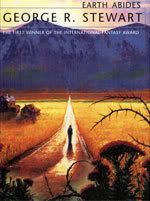
Memory #1

The Illusionist & The Prestige
I recommend watching both of these films, but avoid a double feature. They need to be watched and appreciated individually for what they are and what they aren't.
The Illusionist
This film begins with a love story between the son of a cabinet-maker and an Austrian Duchess, Sophie von Teschen. It’s an unusual match within a class conscious society, but the boy has a talent for illusion and from the very beginning, he enchants von Teschen with his charm and skill.
Inevitably, the characters’ respective stations in life prohibit them from pursuing their relationship into full adulthood, and the young boy leaves to travel the world and become The Great Eisenheim, a master illusionist. Sophie, on the other hand, is betrothed to Prince Leopold in a political move to gain Hungarian support for the crown. This is unfortunate for Sophie, because Leopold is not an upstanding fellow.
By chance, Eisenheim returns to
Visually, the film is soft and warm with the occasional addition of the iris effect to add historical ambiance. The illusions created by Eisenheim are lovely, and they’re also poetic in a way that only Edward Norton could present. The poetry was in the words used, but it was punctuated by Norton’s movement and specifically his strong ability to act and emote subtly with his eyes.
I was very, very pleased with this film, and I'm also thinking about picking up the soundtrack by Philip Glass.
The Prestige
Hugh Jackman and Christian Bale are illusionists who become entangled within a tale of bitter rivalry and revenge. As is often the case, the story begins with the tragic death of a beautiful woman, and it moves towards a quest by Jackman to discover exactly how Bale is staging his greatest trick.
There’s a lot of eye-candy in this film particularly where Nikola Tesla is concerned. (Did I mention that I have a soft spot for Serbian-American physicists who hold a passion for electrical currents and extraterrestrial radio signals...?) Unfortunately, while the role of Tesla makes good sense at the beginning of the film…as a diversion, it later becomes a deus ex machina for Jackman’s character, and in my opinion, detracts from the truly interesting part of the film...Bale’s method.
The Prestige is worth seeing, but honestly, I feel that the Illusionist is a finer film, and I’m a bit perplexed by the incongruity in recognition (Academy Award nomination aside) between the two films. They both came out at approximately the same time, but I’ve experienced more press and praise for The Prestige than I have for The Illusionist. Perhaps, it’s because The Illusionist contains more subtlety, and many people don’t like to work for the story.
The War of The Worlds by H.G. Wells
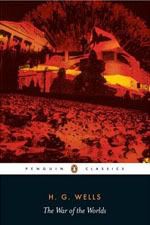 The Martians decide to come to England for afternoon tea, but upon arriving, they realize that they’ve nothing suitable to wear. They channel Nikon and design a wardrobe that would make Thierry Mugler drool. The Victorians are aghast as the Martians flaunt WAY to much leg for polite society, and they actively shun their tentacle laden visitors. Thus begins the
The Martians decide to come to England for afternoon tea, but upon arriving, they realize that they’ve nothing suitable to wear. They channel Nikon and design a wardrobe that would make Thierry Mugler drool. The Victorians are aghast as the Martians flaunt WAY to much leg for polite society, and they actively shun their tentacle laden visitors. Thus begins the Who will find victory on the runway? Will it be the Martians decked out in finery woven from deadly black smoke and glorious red weed or will the Victorians reign supreme in their bustles, bodices, waist coats, and top hats?
I’ll never tell, but I will say that H.G. Wells has spun a fine yarn of alien invasion, and I thank JRC-1138 for reminding me to read this book that I should have read years ago. It contained all of the anachronistic elements that stimulate me on an aesthetic level, and it truly did have moments that made my skin crawl (in a good way)…one particular scene that comes to mind is a certain Martian and its delectable human captive. I’m also quite fond of the red weed that invasively blankets the land (not unlike the Kudzu of the
Stroh Violin
The sound is a bit different than the standard violin, and you can view a video of the instrument being played at the Die Stroh-Violine website.
As I understand it, Tom Waits still uses this instrument in some of his recordings.
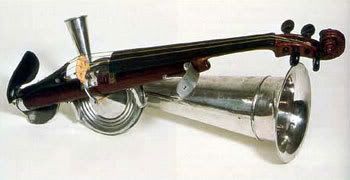
Earth Abides
Earth Abides is a post-apocalyptic novel about a pandemic that has wiped out the majority of humankind. It won the International Fantasy Award in 1951.
The protagonist is aptly known as Isherwood Williams or Ish. This is an anthropological reference to Ishi, the last member of the Yahi Indian tribe who emerged from the
While on an extended camping trip, Isherwood Williams is bitten by a rattlesnake who’s bite provides immunity to the plague. He returns to civilization only to find that entire towns have been abandoned as people either died or moved towards larger cities in search of medical care.
In these larger cities, Ish comes across small groups of people who have survived. Some have gone insane, turned to alcohol abuse, and/or simply given up their will to survive. Others have attempted to carry on in whatever way that they can, and this is what Ish decides to do.
He travels across the
What makes this novel interesting is the lack of initial struggle that occurs for survivors during the time following the plague. Electricity continues to function for a short period, and water supplies travel through the plumbing system for even longer. There are an ample amount of supplies available, including enough canned goods to feed the remainder of the human race for years. Unfortunately, this leads to a certain amount of apathy.
Earth Abides envisions the slow and inevitable decay of the human race as nature ebbs and flows with the collapse of technology and human control. It also chronicles the struggle that occurs within Ish’s own mind about how to maintain knowledge and culture while his companions are comfortable living on the remains of the previous society.
Steampunk Forum
So much wonderfully fun information!
Robert and Shana ParkeHarrison
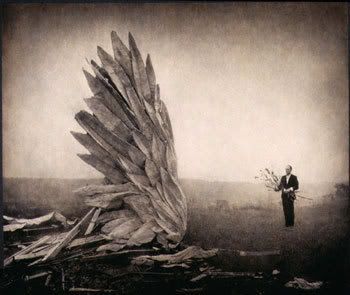
Sometimes the images immediately evoke a sense of sadness for the loss that human expansion and ambition have brought to the Earth while at other times, the ParkeHarrison's rely upon the absurdity of technology to get their message across.
There are also some interesting steampunk elements to their work, so if you're interested in that genre, definitely take a look at some the ParkeHarrisons' additional images. There's a full exhibition online entitled The Architect's Brother.
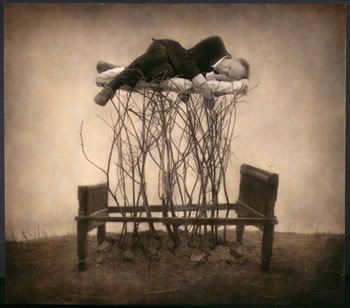
Master's of Photography also hosts a ParkeHarrison portfolio containing 23 images.

